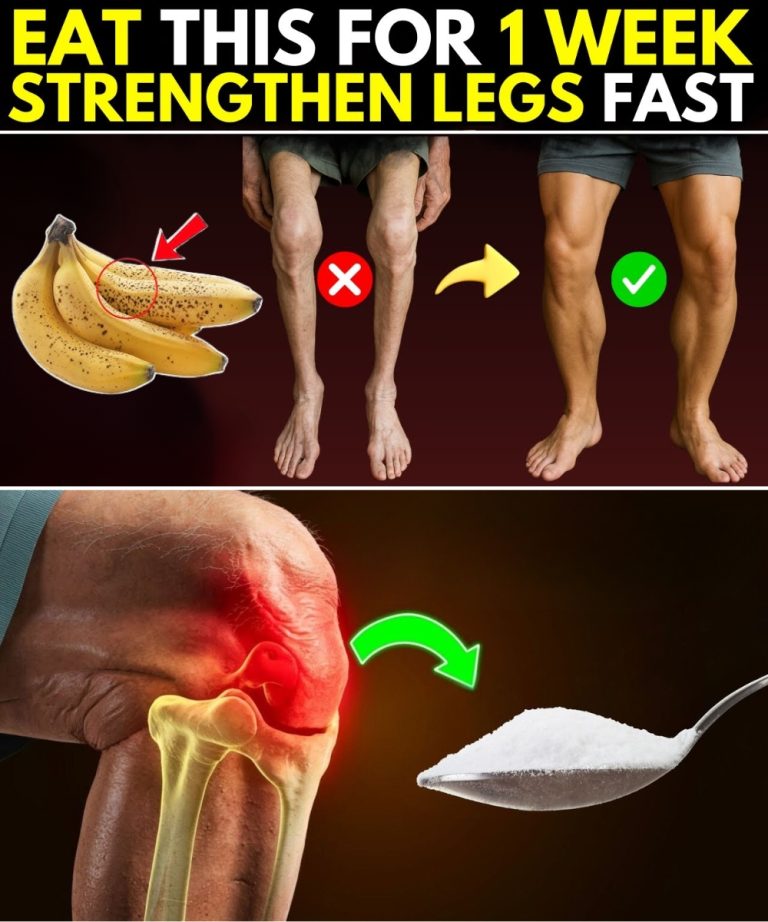ADVERTISEMENT
Introduction
Maintaining strong bones and healthy muscles is essential for overall wellness and mobility at every stage of life. A balanced diet rich in specific nutrients can help restore bone density, prevent muscle loss, and keep your body functioning optimally. The right foods provide calcium, vitamin D, protein, magnesium, and other vital minerals and vitamins that support bone regeneration and muscle repair.
In this article, we’ll explore 25 powerhouse foods known for their bone- and muscle-boosting benefits, plus simple ways to include them in your meals. Whether you're recovering from an injury, aiming to enhance athletic performance, or just want to age gracefully with strength, these nutrient-packed options will fuel your body right.
Ingredients: 25 Nutrient-Rich Foods for Bone and Muscle Health
Kale — Loaded with calcium and vitamin K, critical for bone formation.
Salmon — A top source of omega-3s and vitamin D for bone strength.
Greek Yogurt — Rich in protein and calcium to support muscles and bones.
Almonds — Packed with magnesium and healthy fats.
Eggs — Provide vitamin D and high-quality protein.
Quinoa — Complete protein and magnesium source.
Broccoli — Offers calcium, vitamin C, and antioxidants.
Tofu — Plant-based protein rich in calcium.
Sweet Potatoes — Contain potassium and vitamin A.
Chia Seeds — High in calcium, protein, and omega-3s.
Spinach — Provides iron, calcium, and magnesium.
Oranges — Great source of vitamin C for collagen production.
Walnuts — Rich in omega-3 fatty acids.
Lean Chicken Breast — Excellent lean protein for muscle repair.
Milk — Classic source of calcium and vitamin D.
Lentils — High in protein and magnesium.
Brussels Sprouts — Rich in vitamins C and K.
Pumpkin Seeds — Magnesium and zinc powerhouse.
Bananas — Contain potassium for muscle function.
Oats — Provide complex carbs and magnesium.
Mackerel — Fatty fish rich in vitamin D and omega-3s.
Cottage Cheese — High in protein and calcium.
Bell Peppers — Vitamin C and antioxidants for muscle repair.
Avocado — Healthy fats and magnesium for bone density.
Beans (Black, Kidney, Pinto) — Plant protein and magnesium sources.
Instructions: How to Incorporate These Foods Into Your Daily Diet
Start your day with a nutrient-rich smoothie: Blend Greek yogurt, spinach, chia seeds, and a banana for a bone-and-muscle boosting breakfast.
Add leafy greens like kale or broccoli as a side or in salads to up your calcium and vitamin K intake.
Incorporate fatty fish such as salmon or mackerel into meals 2-3 times per week for vitamin D and omega-3 fatty acids.
Snack on nuts and seeds like almonds and pumpkin seeds for a magnesium and healthy fat boost.
Swap out regular rice for quinoa or lentils in meals to increase protein and mineral intake.
Use tofu or beans in vegetarian dishes to maintain high protein without meat.
Make a hearty stew or chili with beans, lean chicken, and bell peppers to pack multiple nutrients into one dish.
Include dairy or fortified plant milks to ensure adequate calcium consumption.
Prepare colorful vegetable stir-fries with Brussels sprouts, bell peppers, and broccoli.
Finish meals with vitamin C-rich fruits like oranges or berries to enhance calcium absorption.
Serving and Storage Tips
Fresh is best: Consume fresh fruits and vegetables promptly to preserve vitamin content.
Store nuts and seeds in airtight containers in a cool, dark place to prevent rancidity.
Cook fish gently to retain omega-3 oils—try baking or steaming rather than frying.
Use leftovers creatively: Add leftover grilled chicken or roasted vegetables to salads or wraps.
Batch cook legumes and grains like lentils and quinoa for easy meal prep during the week.
Refrigerate dairy products promptly and consume by their expiry date to maintain freshness.
Variations
ADVERTISEMENT
